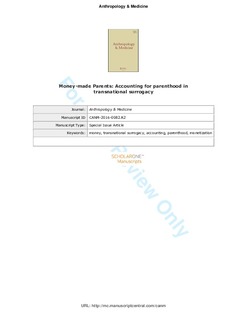Accounting for the money-made parenthood of transnational surrogacy
Journal article, Peer reviewed
Accepted version
Permanent lenke
http://hdl.handle.net/11250/2583222Utgivelsesdato
2018Metadata
Vis full innførselSamlinger
Originalversjon
10.1080/13648470.2017.1392100Sammendrag
In the last decade, transnational surrogacy has attracted world-wide attention for making babies and pregnancies exchangeable with money. Involuntarily childless couples and individuals travel abroad and pay to have the desired child and to become parents. Acknowledging the importance of asking into the consequences of this monetization of reproduction, the author takes issue with universalistic assumptions about money and markets, and their presumed universal effects on social relations. Instead, it is argued that we need to explore how money works, and, by extension, how transnational surrogacy works out and becomes viable to people as a way to become parents. Putting together insights from economic sociology, and the assisted reproductive technology and parenting culture literature, the author employs the notion of accounting to grasp how people make sense of the money involved in making them parents. Based on a study involving 21 interviews with Norwegian gay and straight couples and single men and women seeking surrogacy abroad, the author explores how money is accounted for in three cases, set in three different countries; India, the United States and Canada. The analysis shows how money is accounted for in particular ways to confirm parenthood. These ways differ depending on the local context and transnational relations; ultimately making differentiated monetized parenthood. This is of significance when we try to conceptualize contemporary parenthood and how money seemingly sustains parenthood in ever more radical ways.
